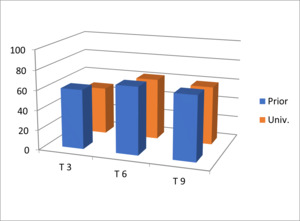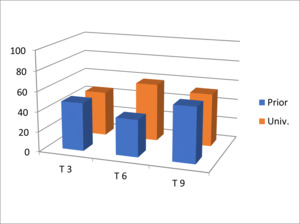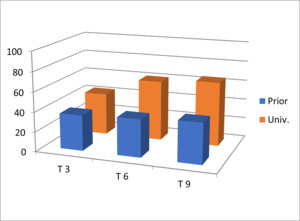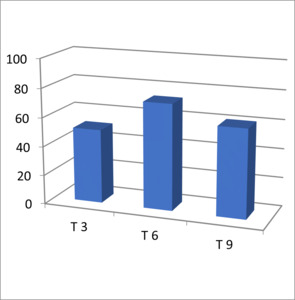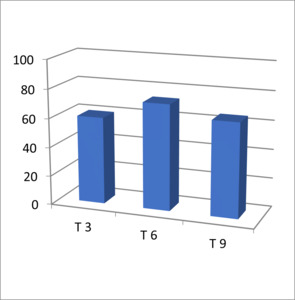INTRODUCTION
The healthcare field is increasingly reliant on evidence-based practice, making scholarship skills an essential component of an education in healthcare. These skills encompass the capacity to retrieve, critically appraise, and effectively apply scientific literature. They are vital for healthcare professionals to stay current, make informed decisions, and provide high-quality care. This study focuses on students at an integrative healthcare university and their development of scholarship skills.
Developing scholarship skills during the course of a healthcare education is crucial. Scholarship skills empower students to engage in research, critically evaluate evidence, and apply research findings to clinical practice. As students progress through their educational journey, they are expected to build and refine these skills, preparing them to be competent healthcare professionals.1 The Council on Chiropractic Education Accreditation Standards includes a meta-competency which addresses these skills.2 Shim and Walczak reviewed the role of faculty teaching practices in the development of these skills in students.3 We found minimal literature on the development of these skills among chiropractic students.
This study was undertaken to evaluate students’ opinions of their scholarship skills prior to enrollment, and their further development while enrolled in an integrative healthcare university, including the role that faculty scholarly assignments played in their skills development.
METHODS
Participants
Participants in this study were comprised of Doctor of Chiropractic (DC), Master of Acupuncture and Chinese Herbal Medicine (MAcCHM), Doctor of Acupuncture and Chinese Herbal Medicine (DAcCHM), and dual DC/ MAcCHM or DAcCHM students from various years (first, second, and third years) who were enrolled at an integrative healthcare university. The MAcCHM and DAcCHM programs fall under the Eastern Medicine Department. The survey was distributed to 220 students, and 206 responded, yielding a response rate of 94%.
Survey Instrument
An IRB-approved survey was conducted among first, second, and third-year students. The survey assessed students’ self-perceived scholarship skills development during their educational journey. The study consisted of 10 questions including which program they were in, the trimester they were in, and 8 questions to measure the students’ ability to retrieve, appraise, and apply scientific literature using a 5-point Likert Scale of Strongly Agree, Agree, Neutral, Disagree, and Strongly Disagree. Students also provided feedback on the influence of course assignments and faculty members in shaping these skills.
The survey was pretested for face validity prior to its administration.
Data Collection
Data were collected through an online survey platform. The survey link was distributed via email to the target participants. Respondents were given a reasonable time to complete the survey.
Data Analysis
Quantitative data from the surveys were analyzed using descriptive statistics in SPSS.
RESULTS
Prior Experience
A significant proportion of the respondents indicated that they had prior experience retrieving scientific literature (64%), but fewer had experience appraising (47%) and/or applying scientific literature (38%). (Figures 1-3)
Development of Scholarship Skills
As students progressed through their education, there was a notable positive trend in the development of scholarship skills. The majority of respondents indicated increased confidence in their abilities in retrieving and applying scientific literature. For retrieving, 1st-year students reported a confidence level of 45%, which increased to 58% for 2nd-year students and 53% for 3rd-year students. Similarly, for applying scientific literature, confidence levels increased from 43% in the 1st year to 61% in the 2nd year and 65% in the 3rd year. (Figures 1-3)
Influence of Faculty and Course Work
A significant finding from the study was the role of faculty and course work in shaping students’ scholarship skills. The survey results revealed that 51% of 1st-year, 73% of 2nd-year, and 61% of 3rd-year respondents believed that faculty had a positive influence on the development of their scholarship skills by modeling scholarship skills in class. For example, referring to scientific literature sources of information and/or critically appraising the literature, and/or applying the information. Additionally, 60% of 1st-year, 73% of 2nd-year, and 65% of 3rd-year students identified course assignments as playing a significant role in enhancing their scholarship skills. For example, assignments that required the student to search scientific literature and/or to critically appraise the scientific literature on a given topic. (Figures 4 and 5)
DISCUSSION
The results of this study provide valuable insights into the development of scholarship skills among students at an integrative healthcare university. The positive trend in skill development observed as students progressed through their education suggests that the curriculum and educational experience are effective in promoting these skills.
Scholarly concentration (SC) programs are common among U.S. medical schools and include scholarly projects, pathways, or tracks, designed to provide medical students with learning opportunities beyond their standardized core curricula, facilitating development of specialized expertise in an area of scholarship, critical thinking, and methods of investigation.4,5
Burk-Rafel et al. completed a national review of 43 top-ranked U.S. medical schools and identified scholarly concentration programs at 32 institutions (74%). However, there was a lack of details and a reproducible, systematic, approach to creating the SC programs. The authors created a data-driven, student-focused, and reproducible approach to creating SC programs using a planning committee of students, faculty, and key stakeholders in addition to a student scholarly pathway/topic survey.6
Stevens DD analyzed surveys and student work of education (EdD) doctoral program students at a U.S. university which indicated that writing and research strategies were instructive, engaging, and useful in building research and writing foundations. Analysis of multiple formative assessments helped the authors refine their instructional strategies during the year of instruction. Because all students completed the first high-stakes program milestone (a comprehensive paper) in year 2, their findings suggested that the university’s research seminar’s instructional strategies established a foundation for student success and timely program progress. The authors recommend instructional practices associated with student research and writing skill development as well as student progress and retention.7
A 2023 study based in the United Kingdom discovered an effective way to deliver an online research course using an active research study that enables medical students to acquire research and scholarship skills. This approach could serve as a model to deliver online teaching in other disciplines requiring the development of student research skills, such as at an integrative healthcare university. The online format would enhance course accessibility and accommodate the needs of students who find it challenging to attend in-person courses, or those with physical disabilities or caring responsibilities. Additionally, online teaching with an active research project encourages greater collaboration between faculty research mentors and students.8
A study examining the scholarship training in Pharm.D. and Pharmacy residency programs identified several barriers to the delivery of research and scholarship training to students. The authors identified programmatic, project, and trainee barriers and developed recommended actions to effectively overcome each of these barriers.9 An integrative healthcare university could follow these recommendations to implement similar training for professional healthcare students.
The role of faculty members and course assignments in shaping students’ scholarship skills is of particular importance. Faculty who serve as mentors, encourage scholarly inquiry, and model scholarship behaviors are crucial in fostering these skills among students. Well-designed course assignments that require students to engage with scientific literature and critically appraise research contribute significantly to skill development. Ha TC, et al. surveyed medical school students in 6 countries in their first year of school and upon graduation. The study found that most medical school students did not experience changes in their inclination towards research or pursuing a research career over the course of their medical training. Students from the United States medical schools were more likely to report having research role models to guide them (51.5% U.S. vs. 0%-26.4% in other countries) and to have published in a peer-reviewed journal (75.7% U.S. vs. 8.9%-45% in other countries). The absence of a role model was significantly associated with a decrease in inclination towards research.10 There have been similar studies on factors that influence the pursuit of research or research career preferences by medical students.11–13
U.K. medical students completed a questionnaire about their perceptions regarding the development of research and scholarship skills in 4 key categories: faculty performance, student skills, teaching content, and teaching format. The support from faculty, content presentation, faculty knowledge about the course materials, and appropriate feedback ranked highest regarding student satisfaction taking the online research courses. Their survey results showed that using an active research study (real-life research based on a topic chosen by the student) led to high student engagement with the online content and motivated them to learn more about the subject.8
A study focused on nursing students in the United States found that having a research mentor helps develop the skills of both the protégé and the faculty members involved. Additionally, participating in research benefits the nursing profession. The students can become competent in research, increase their knowledge on the subject matter, as well as progress in their careers. Morrison-Beedy et al. found that mentoring not only helps the less experienced practitioners, giving them tools to develop their expertise, but also gives the faculty members who participated additional rewards as well. The benefits of the mentoring relationship include the personal satisfaction of helping students or less senior faculty members develop skills, as well as an increase in productivity.14
Participants in our study were comprised of Doctor of Chiropractic (DC), Master of Acupuncture and Chinese Herbal Medicine (MAcCHM), Doctor of Acupuncture and Chinese Herbal Medicine (DAcCHM), and dual DC/ MAcCHM or DAcCHM students from various years (first, second, and third years) who were enrolled at an integrative healthcare university. The MAcCHM and DAcCHM programs fall under the Eastern Medicine Department. (Table 1)
The dual DC/ MAcCHM or DAcCHM students also completed the courses shown below. (Table 2 and 3)
Scholarship skills are essential for healthcare professionals to make informed decisions, critically evaluate evidence, and contribute to the advancement of the field. The findings of this study emphasize the importance of integrating scholarship skill development into healthcare education.
Limitations: First, this study focused on a single institution, which may limit the generalizability of the findings to other healthcare universities. The study’s reliance on self-reported data introduces potential bias in the results. Additionally, the study did not consider the influence of extracurricular activities or external factors on scholarship skill development.
CONCLUSION
This study demonstrates that scholarship skills among students at an integrative healthcare university tend to develop and improve as they progress through their education. The positive trend observed in retrieving and applying scientific literature skills suggests that the curriculum and educational experience effectively promote these skills.
The significant influence of faculty members and course assignments in shaping students’ scholarship skills underscores the importance of a supportive learning environment. Faculty who model scholarship behaviors and engage students in research activities play a pivotal role in fostering these skills.
Future research in diverse educational contexts and with larger, more diverse samples could further validate and expand upon these findings. Nevertheless, the efforts of this institution serve as a model for other healthcare universities seeking to enhance student scholarship skills and to produce competent and research-savvy healthcare professionals.
Furthermore, we recommend that integrative healthcare universities consider creating online research and scholarship courses, and research and scholarship tracks that span the length of the program. Suggested topics are healthcare ethics, biostatistics, public/global health, or profession-specific research, with a capstone project to include faculty advisors, institutional review board (IRB) applications, a research paper including data analysis, and poster presentations in a mock-conference format. It is important for faculty with research experience and publications to model the process from research question to publication, as well as to mentor the students during the entire research project.
Acknowledgments
We recognize and thank the participants in this study, and Jenny Yu, DACM, Lac, Dean, Eastern Medicine Department for supplying the details of the Eastern Medicine Department courses.
